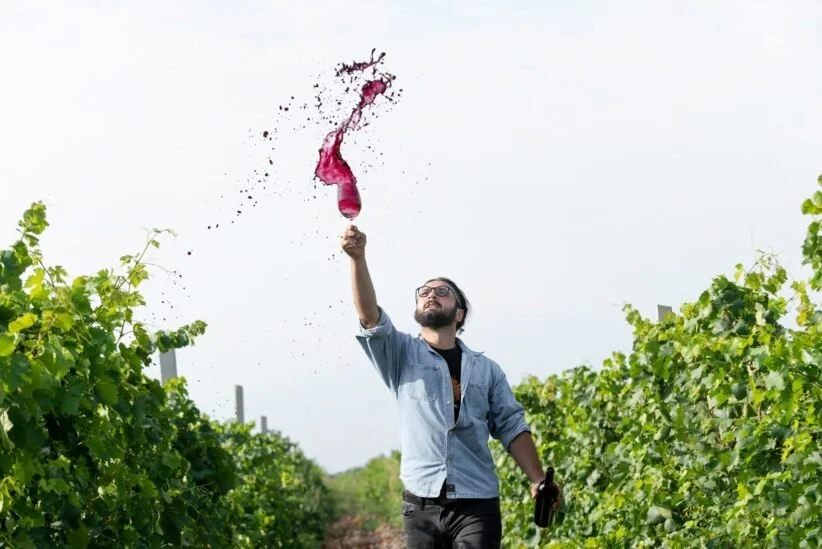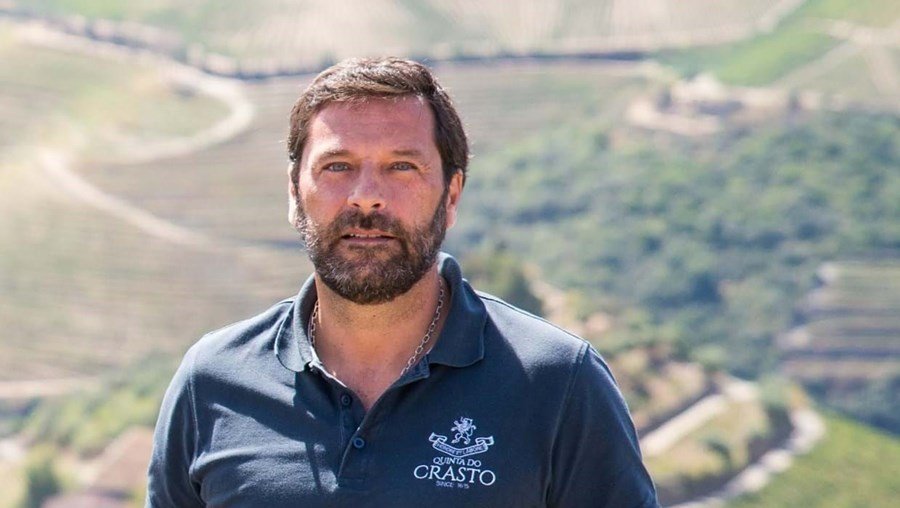OLD VINE HERO AWARD 2023 - SHORTLIST
We've been truly inspired by the response to our first Old Vine Hero Award. Both quantity and quality has made reaching the shortlist very hard. And now its your turn to help, we need your votes!
The Old Vine Hero Award 2023 will be awarded to one of the 8 shortlisted nominees that receives the most votes from you, the global wine community. Below you will find a summary of the contribution each of the shortlisted nominees is making towards the positive progression of the Old Vine movement. Read through them all before you decide which you would like to see receive the Award.
Voting will close on Monday 13th March, votes will be counted and the winner notified on Tuesday 14th March. The winner will be announced at our Old Vine Conference Community Dinner in London on Wednesday 15th March.
Details of how to vote are at the bottom of the page - good luck to all the nominees!!
Derek Mossman-Knapp & Pilar Miranda
Derek Mossman-Knapp & Pilar Miranda, Garage Wine Co., Chile
“In these times it is important to stand for what you believe in, and more importantly to build the kind of business you believe in. At Garage Wine Co. we revive old vineyards in marginalised Chilean communities to make coveted wines.” Derek Mossman Knapp
Garage Wine began quite literally in Pilar Miranda and Derek Mossman Knapp’s Garage. Today Garage Wine Co. makes wines from small parcels of individual vineyard sites, working in conjunction with local growers. Focusing on dry irrigated old vines, they produce dry-farmed field-blends of Carignan, Garnacha, Monastrell, País, Cinsault and Cab Franc grown on pre-phylloxera rootstock with small farmers in the Maule and Itata. The vineyards are on the old Coastal Range of mountains closer to the Pacific — Chile’s other mountains. These are older and cooled more slowly so they have granitic soils, many with intrusions and cracks for roots to get deep down into. Utilising regenerative farming techniques, they cultivate these vineyards with the local community, who work with horse and plough as local families have done for generations.
Katie Jones
Katie Jones, Owner & Winemaker, Domaine Jones, South of France
Katie bought her first vineyard in 2008 in the South of France and now produces wines exclusively from very old vines and (exceptionally small yields) in and around the village of Tuchan, in rural South of France. With old vines aged from 50 to 116 years old , Jones is able to make single varietal unusual wines like Carignan Gris and Macabeu and the Hairy Grenache (a hairy leafed Grenache aka Lledoner Pelut).
Through Jones’ virtual vineyard rambles on instagram live throughout lockdown and via her Adopt an Old Vine Scheme, Katie Jones has been able to show her followers first-hand what old vines mean for a winemaker, for the community and for the end product.
Making old vine heritage matter to consumers - championing the message of old vines to both consumers and trade in the most engaging and enlightening way, through modern accessible communication platforms (Facebook, Youtube, Insta and in-person events).
Bringing the vineyard to life for the consumer and showing how old vines play such an enormous role in the quality of the wine, the history of the land and the communities who have lived and worked there over so many years.
Pierpaolo Sirch
Pierpaolo Sirch, Director of Production, Feudi di San Gregorio, Irpinia, Italy
The protection of indigenous varietals and old vines has always been an objective for Feudi di San Gregorio. To achieve this, the vineyards have undergone extensive mapping and cataloguing; research has been carried out to study their evolution through the vegetative and productive cycle, and all of these factors have come together like pieces in a mosaic under the leadership and guidance of Pierpaolo Sirch, winemaker & Chief Agronomist, is leading Feudi di San Gregorio & Basilisco's.
Today, Feudi di San Gregorio works with around 300 hectares of vines in and around Irpinia, of which about 50 hectares are small vineyard plots of Aglianico that are over 150 years old.
Irpinia is one of the most extraordinary wine-growing areas in the world. Its favourable soil and climatic characteristics, and the ability of its people to wisely manage these resources have over the centuries made it possible to hand down knowledge about valuable practices that elsewhere have been forgotten. Pierpaolo Sirch, unequivocally explains:
“In a de facto sense, Irpinia is an immense genetic database, a treasure trove of different aromas and flavours that have disappeared from our taste memory, but which absolutely deserve to be preserved. For Feudi di San Gregorio,” he says, “the challenge is to seek out and protect diversity for itself. Non-homogeneity is a key value for the wine of the future, and not just for Feudi.”
Gomidas Merjanian
Gomidas Merjanian, Dzon Merjanian Vineyards, Armenia
DZON Merjanian Vineyards is a small location on geographic map, but the vineyard is a part of a long history that has survived soviet times. The vineyard is about one hectare of 70 to 150 year old bush vines and own rooted of Areni Noir grapes that remain in the ground thanks mainly to the impassability of trucks to reach, uproot and replant them in favour of brandy production.
Gomidas Merjanian is the man behind the DZON Old Vines project and is singlehandedly responsible for its revival both physically clearing it of wild bushes and other invasive plants and in the promotion of native Armenian varieties and the wines they produce. DZON’s flagship label is an Old Vine Areni Noir dry red wine sourced from a 150+ year-old vineyard in the Aghavnadzor village of the Vayots Dzor wine region in Armenia.
Aside from producing premium quality wines from the old vines Gomidas also shares his belief, passion, and knowledge of Old Vines and how to work with them, with the winemaking and wine-loving communities locally and abroad further contributing to the appreciation of the Old Vines culture.
@dzonwine
facebook.com/DzonWine
Tomás Roquette
Tomás Roquette, Quinta do Crasto, Douro, Portugal
Vinha Maria Teresa was named after the first granddaughter of Constantino de Almeida (the founder of Quinta do Crasto). It is a centenary 4.7ha plot of vines and one of the oldest on the estate. Situated on the eastern slope of the property, at extremely low altitude near the Douro River, it is planted on dry stone terraces or socalcos that have excellent sun exposure.
In 2013, due to the advanced age of the Vinha Maria Teresa, Quinta do Crasto began the genetic mapping of each variety. The idea was to replace some of the dead vines with genetically identical varieties so that they might perpetuate the terroir and the field blend of such a unique plot. Quinta do Crasto, in partnership with the Universidade de Trás-os-Montes e Alto Douro (UTAD), developed a project called PatGen Vineyards, which seeks to identify all of the varieties that make up the Vinha Maria Teresa. To date 54 different varieties have been identified, including four white grape varieties and one unknown red grape variety, in other words, one which has yet to have been matched anywhere.
Vineyards like the Vinha Maria Teresa are an example of what makes old vine wines so special. This treasure, these unique characteristics of the Douro vineyards, makes this emblematic estate an example of the cultural heritage that belongs to us all. And it is why the work of Tomás Roquette is so important to protect and to safeguard this legacy for the enjoyment of generations yet to come.
Victoria Gonzalez - Gordon
Jose Mª Ayuso & Victoria Gonzalez - Gordon: Angel de Viñas, Gonzalez Byass', Spain
Angel de Viñas is an initiative that was launched in 2021 to rescue, preserve and bring old vineyards back into production that are on the verge of extinction in Spain. These old vineyards are the guardians of centuries of culture and tradition, they are historic treasures of nature and are pivotal to safeguarding the biodiversity of the surroundings where the wines come from. So far the Angel de Viñas project has helped 4 vineyards in D.O. Rueda, D.O. Penedes, D.O. Monterrei and D.O Arribes.
Ángel de Viñas marks a step further towards Gonzalez Byass' objective of ensuring the conservation of natural and historic heritage, both of which are closely linked to the local environment. It reflects their commitment to looking after and protecting the soil and the vineyards, in line with their Sustainable Development Goal number 15: “Life on Land”.
“Ángel de Viñas” promises to add three old vineyards to the project every year with a commitment to ensuring they continue to exist and are cultivated with a long term view.
The support of each of the old vineyards will run for a minimum of 3 years and may take the form of buying grapes, providing economic help or supporting with work that is essential to maintaining the vineyard. So far there are 4 vineyards in the program and they are working on the 5th and 6th which will start during harvest 2022/2023.
gonzalezbyass.com/es-en/news/angel-de-vinas/find-out-more-about-angel-de-vinas-our-support-and-old-vines
Dr Laura Catena
Dr. Laura Catena, Managing Director, Catena Zapata & Founder, Catena Institute of Wine
Dr. Laura Catena is a fourth-generation Argentine vintner, biologist, physician and author, internationally recognized as the “face” of Argentine wine for her active role in promoting the Mendoza wine region and Argentine Malbec. She has been Managing Director of Catena Zapata since 2009 and owner of Luca and La Posta wines (established in 1999) and Domaine Nico (first vintage in 2016).
In 1995, Laura founded the Catena Institute of Wine (CIW) with the goal of using science to understand the Mendoza terroir and to elevate Argentine wine on the world wine stage. What followed was the first massale and clonal selection of pre-phylloxeric Malbec in the world and in-depth studies of high-altitude terroir. The CIW has collaborated with key universities locally and globally, including UC Davis, the University of Bordeaux, and University of Burgundy, with 30+ articles published in major scientific wine journals (see appendix). The CIW also took a leading role in the development of Argentina’s Sustainability Code (instituted in 2010), now widely used by Argentina’s wine industry.
Rebecca Robinson
Rebecca Robinson, Executive Director, ZAP (Zinfandel Advocates and Producers)
Rebecca Robinson has been the Executive Director of Zinfandel Advocates and Producers (ZAP) for 30 years. ZAP is a 501c3 non-profit organization devoted to the promotion of Zinfandel tradition, historic and new vineyards, wines, and wineries. She has effectively led a diverse association of hundreds of producers, growers, trade, media, and consumers whose mission is the preservation of California's Zinfandel tradition.
Under Rebecca's leadership the organization has raised millions of dollars through memberships, events, international travel experiences, auctions, and grants from the California Department of Food and Agriculture (CDFA). Rebecca was also instrumental in driving, funding, and promoting the U.C. Davis Heritage Vineyard clonal research project which has resulted in the identification and certification of heritage clones that are now available for planting through the university's Foundation Plant Services (FPS); ZAP's Legendary Vineyards program has served to identify and educate consumers, media and trade about the uniqueness and vital importance of California's oldest Zinfandel vineyards - many of which date back to the 19th Century and the origins of California agriculture.
ZAP's Communications Committee, led by Rebecca Robinson serves to produce messaging to trade, media and consumers about the uniqueness, cultural and agricultural heritage, and qualities of California Zinfandel and ongoing ZAP programs.
NOW IT’S TIME TO CAST YOUR VOTE:
Head over to the voting form here: https://forms.gle/KEn87wayABfmCpiz6









